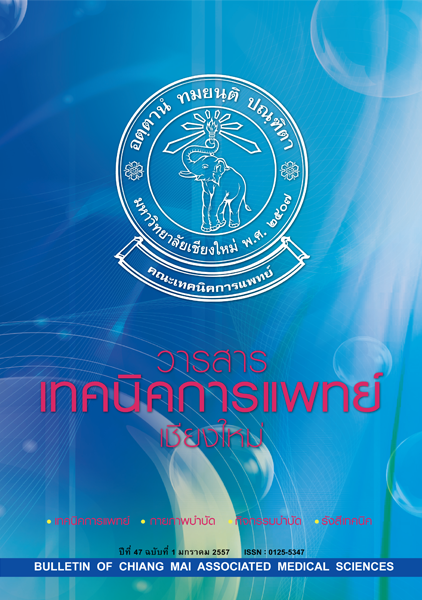CD 147 scFv intrabody-mediated CD147 knockdown inhibits proliferation of human cervical cancer HeLa cells
Main Article Content
Abstract
Introduction: CD147 is a glycoprotein of the immunoglobulin superfamily that is highly expressed on various cancers. CD147 regulates multiple processes including tumor growth, invasion, metastasis, and angiogenesis by interaction with its associated proteins including α3β1-integrin. α3β1-integrin is a multifunctional protein and contributes to the regulation of cell growth. Thus, inhibition of CD147 cell surface expression in tumor cells may attenuate the proliferation of cancers via dysregulation of α3β1-integrin. Intrabody is an alternative strategy for success in the functional knockdown of target molecules. The chimeric adenoviral vector Ad5/F35 carrying gene encoding scFv against CD147 was generated for infecting low CAR-expressing cells by utilizing CD46 as the cellular receptor.
Objectives: In this study, we proposed to examine the function of the scFv intrabody specific to CD147 using Ad5/F35 gene transfer vectors in the downregulation of CD147 expression as its conventional Ad5 gene transfer vector in the HeLa cells prior to transduction into low CAR-expressing cells.
Materials and methods: The expression of adenoviral receptors, CAR, CD46, and αv-integrin, in HeLa cells was examined prior to the adenoviral transduction. The expression of α3β1-integrin and the proliferation of the CD147-knockdown HeLa cells were also investigated.
Results: The results revealed that CAR, CD46, and αv-integrin are expressed on the cell surfaces of HeLa cells. Transduction of intrabody specific to CD147 using Ad5/F35-based vectors showed that the CD147 expression on the cell surface of the transduced HeLa cells was significantly inhibited and that cell proliferation as measured by MTT assay was also significantly attenuated. Surprisingly, α3β1-integrin expression was not significantly reduced. Perturbation of the CD147 cell surface expression via scFv intrabody specific to CD147 using Ad5/F35 gene transfer vector resulted in the inhibition of HeLa cell proliferation but it did not influence the α3β1-integrin expression.
Conclusions: We postulated that CD147 may affect the expression or function of the other proteins involved in the proliferation. This hypothesis should be further investigated.
Bull Chiang Mai Assoc Med Sci 2014; 47(1): 30-36
Article Details
Personal views expressed by the contributors in their articles are not necessarily those of the Journal of Associated Medical Sciences, Faculty of Associated Medical Sciences, Chiang Mai University.


